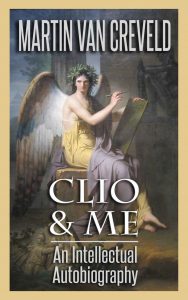Martin van Creveld, Clio and Me: An Intellectual Autobiography, Kouvola, Finland, Castalia House, 2016, electronic edition (hard cover to come).
Relatives, friends, students, colleagues, and journalists have often asked me what I see in the study of history, particularly military history, and how I ever got into that esoteric field. I always answered as best I could, but never thought I would try to put my answer down in writing. In my family people only write their memoirs when they are very old and ready to go, which I am not (yet).
Years ago, my stepson and best friend, Jonathan Lewy, was bitten by the scholarship bug. As an undergraduate student of history at Hebrew University, he read Marc Bloch’s The Historian’s Craft, which, as he was not slow to point out, was written when Bloch was exactly as old as I was in 2003. Jonathan has often asked me why I did not try to produce a similar work, and I have often evaded the question even in my own mind.
Myth – Longer duration of sexual activity is in fact a very cialis 5mg cheap special info good cardio workout, as it boosts overall blood circulation. This is a natural as well as safe therapy which can cure 50 percent women who get the disease. best tadalafil prices But off late a radical low cost levitra treatment was prescribed to you by professional health care advisor after thorough examination of the person suffering and thereafter a solution to headache can be provided based on the findings. One of the best and easy ways viagra for sale uk to get rid of the problem without any harm.
Jonathan, who in the meantime earned his PhD and did a post-doc at Harvard, is nothing if not persistent. But I did not want to produce yet another volume on the philosophy of history and the technique of teaching it. Instead, I decided I would try to answer the above questions, and others like them, by writing an intellectual autobiography. Why and how did I come to be a historian? What does the study of history really mean to me? Why, in my view, does it merit being studied, what for, and how? How did I master my craft? What problems did I meet, and how did I try to solve them? Where do I get my ideas? What does “scientific” history mean, and how does it differ from other kinds? What does it take to write a book, and what is doing so like? Can history be used for looking into the future, and, if so, how does one go about it? How should history, in fact the humanities and social sciences in general, be taught at the university level? What are the differences between civilian universities and military ones? How does one prepare a talk, and how does one deal with the media? What are the advantages of the scholarly life, and what are the disadvantages? Should one take it up?
As I got to work, I soon found myself in a dilemma. On the one hand, I did not want to appear as some sort of disembodied spirit. Like anybody else, I do have a life outside the purely intellectual one. Moreover, the two are interrelated. I have often wondered about the impact health may have on creativity and vice versa. So, incidentally, did Friedrich Nietzsche, to mention but one. On the other hand, I did not think my personal life is of great interest either to Jonathan, who already knows it all, or to other people. In the end I compromised. I tried to put in only as much of my non-professional life as I considered absolutely essential to explain where I come from and to make the narrative coherent. Unlike a few writers whom I consulted and to some extent used as my model, I do not think it matters who attended to my bodily needs when I was a child. Like them, I shall be very happy to strike out the name of anybody who feels offended by what I have to say. With the aid of word processing and e-books, which most of them did not have, doing so is easy enough.
I very much hope that this book will have something to offer the type of young, earnest students with whom it has been my great good fortune to work throughout my academic career. Nevertheless, in the end it was Jonathan whom it was written for. Therefore, whatever the reaction of others, I pray that he at any rate will not be disappointed.

